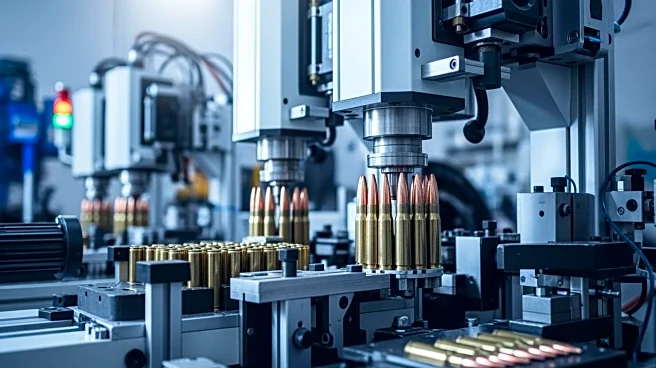What's Happening?
NATO has overtaken Russia in ammunition production, marking a significant shift in defense capabilities. Secretary General Mark Rutte announced this development at a NATO industry forum in Bucharest, highlighting the alliance's increased output and faster
delivery times. This change comes as NATO opens new production lines and accelerates defense sector deliveries. Rutte emphasized the importance of long-term investment and strategic competition preparation, noting that Russia's war against Ukraine remains a significant threat. Despite NATO's advancements, Rutte warned that Russia will continue to be a destabilizing force in Europe and globally.
Why It's Important?
The increase in ammunition production by NATO signifies a strategic advantage over Russia, potentially altering the balance of power in Europe. This development is crucial for NATO's deterrence and defense posture, as it prepares for prolonged strategic competition. The alliance's ability to out-produce Russia could enhance its military readiness and influence in global security matters. However, the ongoing threat posed by Russia necessitates continued vigilance and investment in defense capabilities. The cooperation among NATO members and their industrial partners is essential to maintaining this edge and ensuring regional stability.
What's Next?
NATO's focus on increased production, innovation, and deeper cooperation with partners like the European Union and Ukraine will be pivotal in maintaining its strategic advantage. The alliance's commitment to investing 5% of GDP in defense by 2035 requires close coordination with manufacturers. As NATO continues to expand its production capabilities, it must also address the growing defense-industrial cooperation among Russia, China, and other authoritarian states. The alliance's ability to outgun and outsmart adversaries will depend on its willingness to take bold actions and risks.
Beyond the Headlines
The shift in ammunition production highlights the evolving nature of global defense strategies, with NATO adapting to new threats and challenges. The alliance's focus on innovation and cooperation reflects a broader trend towards modernization and strategic partnerships. This development also underscores the importance of maintaining a strong defense industry to support NATO's deterrence efforts. As geopolitical tensions persist, NATO's ability to adapt and respond to emerging threats will be crucial in shaping the future of international security.















